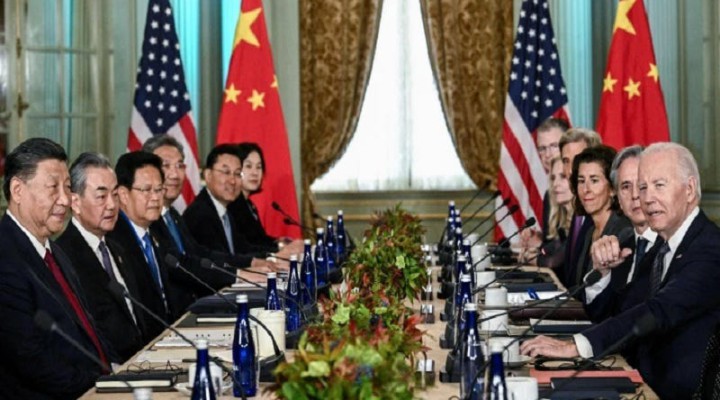The Xi-Biden Summit Might Help Better Manage The Sino-US Rivalry

It would be premature to conclude that their prior implied talks about a “New Détente”, or a series of mutual compromises across multiple domains aimed at reaching a “new normal” in their ties, are back on track. Too much has happened since February’s balloon incident derailed that grand strategic trajectory, but a moderate series of mutual compromises is indeed possible. Instead of resolving their rivalry, however, they’d only serve to better manage it.
Presidents Xi and Biden met for the first time in a year on Wednesday at the Asia-Pacific Economic Conference (APEC) in San Francisco. Their get-together took place as the US gradually disengages from the Ukrainian Conflict and amidst the unexpected Israeli-Hamas war that abruptly refocused its attention away from all other Eurasian fronts. This context has led to associated questions about the future of its grand strategy, namely whether it should “Pivot (back) to Asia” as planned or consider something else.
American stockpiles have been depleted due to over 20 months of armed aid to Ukraine, but they’re now stretched to the breaking point as a result of its security commitments to Israel. The US can therefore ill afford indirect involvement in any more major conflicts abroad, yet that’s precisely what it’s been provoking against China, particularly via its support of the Philippines’ maritime claims and Taiwanese separatism. Everything could quickly spiral out of control if this policy doesn’t soon change.
Therein lies the wisdom of agreeing to resume military communication with China, which follows the latter confirming the sacking of former Defense Minister Li Shangfu weeks prior after his lengthy disappearance. Regardless of whatever might have been behind that second move, its relevance to the Xi-Biden Summit is that it facilitated the aforementioned resumption of military communication. This will in turn help reduce the odds that their New Cold War rivalry leads to a major conflict by miscalculation.
It would be premature to conclude that their prior implied talks about a “New Détente”, or a series of mutual compromises across multiple domains aimed at reaching a “new normal” in their ties, are back on track. Too much has happened since February’s balloon incident derailed that grand strategic trajectory, but a moderate series of mutual compromises is indeed possible. Instead of resolving their rivalry, however, they’d only serve to better manage it.
That outcome would be a net positive for global stability, but it also poses some challenges for other leading stakeholders in the global systemic transition, especially India and Russia. Those two won’t ever say so directly, but they’re concerned about the return and subsequent retrenching of the brief bi-multipolar period whereby the Sino-US interplay disproportionately shaped the world. This roughly occurred from the late 2010s till the start of Russia’s special operation and wasn’t ideal for either.
To be clear, the US remains one of India’s most important strategic partners anywhere in the world while Russia is in an unofficial Entente with China, but each of their counterparts regards the management of their New Cold War rivalry to be more important than their ties with India and Russia respectively. That being the case, it can’t be ruled out that the incipient thaw in Sino-US tensions might lead to unforeseen challenges for India and Russia, whether unintentionally or by design.
For instance, the US might turn a blind eye towards some Chinese moves in the Himalayas – Ladakh, Bhutan, and/or Arunachal Pradesh – that India regards as national security threats if it concludes that this would redirect its focus away from maritime disputes and thus avert a possible Sino-US war. Likewise, China might encourage more of its companies to comply with the US’ anti-Russian sanctions if it concludes that this could help advance possible Sino-US talks aimed at resolving their trade war.
Either scenario could unfold unintentionally due to policymakers’ perceptions of their country’s objective national interests or deliberately if their counterparts discretely request such a quid pro quo. The purpose in pointing this out isn’t to fearmonger about the future of Indo-US or Sino-Russo ties, but simply to draw attention to the newfound impetus for further expanding Indo-Russo ones. This aligns with Valdai Club expert Andrey Sushentsov’s efforts to brainstorm a new “big idea” for their ties.
The preceding hyperlinked analysis proposes that the concept of tri-multipolarity, which is detailed therein and was earlier hyperlinked in this present piece with respect to the global systemic transition, could satisfy this grand strategic need. It frames the aforesaid transition in a way that acknowledges the significance of these four Great Powers’ interplay for shaping the future world order. This latest Xi-Biden Summit makes it more relevant than ever due to the incipient thaw in their countries’ tensions.
As was earlier written, the outcome of their meeting is a net positive for global stability, though it also entails unforeseen challenges for India and Russia, not to mention smaller- and medium-sized states with less sovereignty than those two. China and the US have the right to pursue their objective national interests as policymakers understand them to be, the same as India, Russia, and everyone else does too. Ideally, a pragmatic balance of these interests will be reached, though it can’t be taken for granted.
https://korybko.substack.com/p/the-xi-biden-summit-might-help-better
 TheAltWorld
TheAltWorld 
6 thoughts on “The Xi-Biden Summit Might Help Better Manage The Sino-US Rivalry”